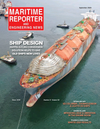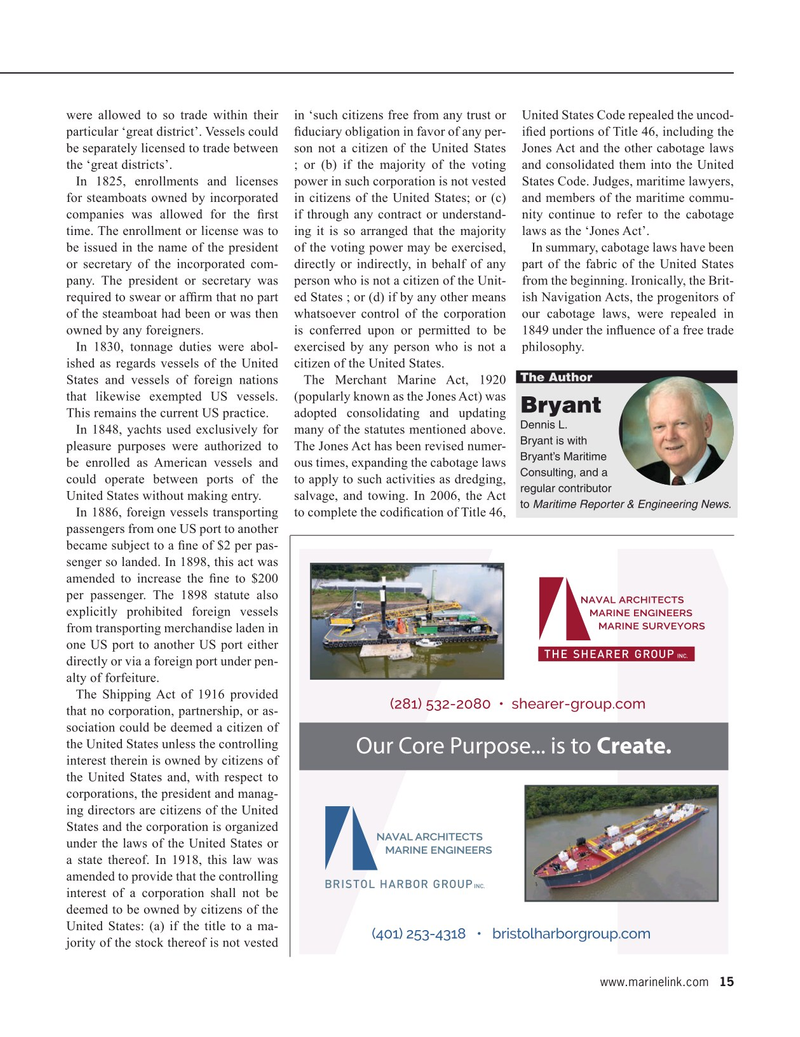
Page 15: of Maritime Reporter Magazine (September 2020)
Marine Design Annual
Read this page in Pdf, Flash or Html5 edition of September 2020 Maritime Reporter Magazine
were allowed to so trade within their in ‘such citizens free from any trust or United States Code repealed the uncod- particular ‘great district’. Vessels could ? duciary obligation in favor of any per- i? ed portions of Title 46, including the be separately licensed to trade between son not a citizen of the United States Jones Act and the other cabotage laws the ‘great districts’. ; or (b) if the majority of the voting and consolidated them into the United
In 1825, enrollments and licenses power in such corporation is not vested States Code. Judges, maritime lawyers, for steamboats owned by incorporated in citizens of the United States; or (c) and members of the maritime commu- companies was allowed for the ? rst if through any contract or understand- nity continue to refer to the cabotage time. The enrollment or license was to ing it is so arranged that the majority laws as the ‘Jones Act’. be issued in the name of the president of the voting power may be exercised, In summary, cabotage laws have been or secretary of the incorporated com- directly or indirectly, in behalf of any part of the fabric of the United States pany. The president or secretary was person who is not a citizen of the Unit- from the beginning. Ironically, the Brit- required to swear or af? rm that no part ed States ; or (d) if by any other means ish Navigation Acts, the progenitors of of the steamboat had been or was then whatsoever control of the corporation our cabotage laws, were repealed in owned by any foreigners. is conferred upon or permitted to be 1849 under the in? uence of a free trade
In 1830, tonnage duties were abol- exercised by any person who is not a philosophy. ished as regards vessels of the United citizen of the United States.
The Author
States and vessels of foreign nations The Merchant Marine Act, 1920 that likewise exempted US vessels. (popularly known as the Jones Act) was
Bryant
This remains the current US practice. adopted consolidating and updating
Dennis L.
In 1848, yachts used exclusively for many of the statutes mentioned above.
Bryant is with pleasure purposes were authorized to The Jones Act has been revised numer-
Bryant’s Maritime be enrolled as American vessels and ous times, expanding the cabotage laws
Consulting, and a could operate between ports of the to apply to such activities as dredging, regular contributor
United States without making entry. salvage, and towing. In 2006, the Act to Maritime Reporter & Engineering News.
In 1886, foreign vessels transporting to complete the codi? cation of Title 46, passengers from one US port to another became subject to a ? ne of $2 per pas- senger so landed. In 1898, this act was amended to increase the ? ne to $200 per passenger. The 1898 statute also ???????????????
explicitly prohibited foreign vessels ???????????????
???????????????
from transporting merchandise laden in one US port to another US port either directly or via a foreign port under pen- alty of forfeiture.
The Shipping Act of 1916 provided (281šA??-??í?ΟEå±uåu-guoup.cNj that no corporation, partnership, or as- sociation could be deemed a citizen of the United States unless the controlling
Our Core Purpose... is to Create.
interest therein is owned by citizens of the United States and, with respect to corporations, the president and manag- ing directors are citizens of the United
States and the corporation is organized ???????????????
under the laws of the United States or ???????????????
a state thereof. In 1918, this law was amended to provide that the controlling interest of a corporation shall not be deemed to be owned by citizens of the
United States: (a) if the title to a ma- (401š?A?-c?OíÎbuGŸtolE±uboucuoup.coj jority of the stock thereof is not vested www.marinelink.com 15
MR #9 (1-17).indd 15 9/9/2020 7:43:27 AM

 14
14

 16
16
